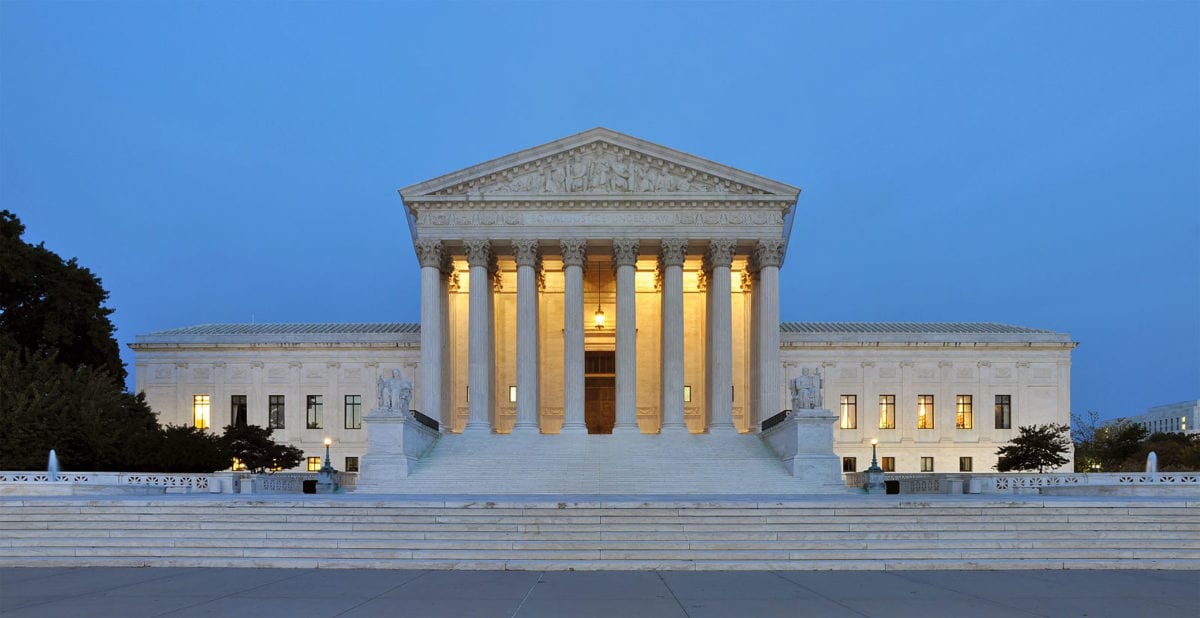
Panorama of United States Supreme Court Building at Dusk: Wikipedia
By Glynn Wilson –
Where are the howls of protest in front of the Supreme Court building in Washington?
Where are the denunciations from unions and the trial lawyer associations?
Where are comments from Democrats on Facebook and Twitter denouncing the U.S. Supreme Court decision on Monday gutting the rights of workers to collectively bargain and sue corporations in court for screwing them out of earned wages?
Maybe everyone is so burned out from more than a year of protesting Donald Trump’s collusion with Russia to steal the presidential election of 2016. Maybe fighting gun violence in the schools and sexual harassment have so occupied the time and attention of the American left that there is no energy left to protest something as basic as workers rights.
Why is my email not popping with outraged statements from the AFL-CIO and the American Association for Justice?
In a close vote of 5-4, which could have been different if workers unions and trial lawyers had been helping elect Democrats instead of Republicans over the past quarter century, the court ruled that “companies can use arbitration clauses in employment contracts to prohibit workers from banding together to take legal action over workplace issues,” according to the New York Times and other news outlets.
The court’s decision dominated by Republican appointees on the conservative wing could negatively affect 25 million employment contracts around the country and cost workers billions in earned wages.
Justice Neil M. Gorsuch, writing for the majority, claimed the court’s conclusion was dictated by a federal law favoring arbitration and previous court precedents. If workers are allowed to band together to hold corporate employers accountable, he wrote, “the virtues Congress originally saw in arbitration, its speed and simplicity and inexpensiveness, would be shorn away and arbitration would wind up looking like the litigation it was meant to displace.”
Horror of horrors. The attempts by Republicans in Congress to strip workers of their rights might be undermined by, well, allowing workers their constitutional rights that have been the law of the land since the 1930s, when the Fair Labor Standards Act and other laws were passed to dig America out of the Great Depression.
Justice Ruth Bader Ginsburg called on Congress to address the issue in a scathing minority dissent, saying the majority opinion was “egregiously wrong.” In an oral statement, she said the upshot of the decision “will be huge under-enforcement of federal and state statutes designed to advance the well being of vulnerable workers.”
Brian T. Fitzpatrick, a law professor at Vanderbilt University who studies arbitrations and class actions, told the Times that the ruling was not really surprising considering the makeup of the court and previous conservative-led decisions, but concluded, “it is only a matter of time until the most powerful device to hold corporations accountable for their misdeeds is lost altogether.”
That time just arrived.
To see how elections matter, the majority opinion was supported by Chief Justice John G. Roberts Jr. and Samuel A. Alito Jr., both appointees of George W. Bush, as well as Clarence Thomas, appointed by George H.W. Bush, and Anthony M. Kennedy, appointed by Ronald Reagan. Bill Clinton appointees Stephen G. Breyer and Ginsburg led the minority, along with Barack Obama appointees Sonia Sotomayor and Elena Kagan.
The decision had to do with three consolidated cases charging that employers had underpaid their workers. Breaking with more than 80 years of labor law, the court ruled in Epic Systems v. Lewis, Ernst & Young v. Morris, and National Labor Relations Board v. Murphy Oil, allowing corporations to force workers into arbitration, stripping them of the right to bring class actions for labor law violations, according to a statement I had to dig up on the American Association for Justice website. I have been trying for years to get trial lawyers, especially in Alabama, to support independent journalism to make a difference in these kinds of cases, to no avail.
“The Supreme Court’s decision is a devastating blow to the fundamental rights of workers as more and more corporations move to silence harassed, abused, and mistreated employees by forcing them into arbitration,” AAJ CEO Linda Lipsen said in the statement. “From employee handbooks to credit card and nursing home contracts, people across the country are having their constitutional rights taken away by powerful corporations. Congress needs to take action to restore the rights of all Americans to seek justice when corporations break the law, rather than continue to allow corporations to exploit workers and consumers by hiding behind secretive arbitration.”
All three companies in this case required employees to sign contracts with forced arbitration clauses. The employees in question had tried to join together, saying that any money they’d win in individual cases would be cancelled out by massive legal fees required to try these cases individually.
About 23 percent of employees not represented by unions are subject to employment contracts that require class-action waivers. In 1992, only 2 percent of non-unionized employers used mandatory arbitration agreements, while 54 percent do these days due to Republicans dominating Congress for most of the past quarter century.
“By joining hands in litigation, workers can spread the costs of litigation and reduce the risk of employer retaliation,” Justice Ginsburg wrote, also pointing out that contracts may also encourage misconduct on behalf of corporations.
“Employers, aware that employees will be disinclined to pursue small-value claims when confined to proceeding one-by-one, will no doubt perceive that the cost-benefit balance of underpaying workers tips heavily in favor of skirting legal obligations,” she wrote, adding that billions of dollars in underpaid wages are at issue and requiring individual arbitrations can produce inconsistent results, particularly because arbitrations are often confidential.
While there is no statement from either the Association for Justice or the AFL-CIO of Alabama, national AFL-CIO President Richard Trumka issued a statement saying that “five justices on the Supreme Court decided that it is acceptable for working people to have our legal rights taken away by corporations in order to keep our jobs.”
“This decision forcing workers to sign away the right to file class-action suits against such illegal employment practices as wage theft, sexual harassment and discrimination is outrageous—and it is wrong,” Trumka said. “In this case, the newest justice has joined the dangerous trend of this court to side with corporations over working people. We call upon Congress to immediately enact legislation making clear that no worker can be forced to give up their right to effectively challenge illegal conduct in the workplace in order to keep their job.”
For a variety of workers, the class action lawsuit has been a powerful tool against employer abuse for decades. This decision strengthens employers’ arguments that forced arbitration clauses don’t violate labor laws, an argument that is questionable on its face. Studies have shown that workers win far less often in mandatory arbitration than in court. Since most arbitration is conducted in secret, mandatory arbitration has helped businesses avoid unfavorable publicity that might compel them to address chronic worker abuses.
The Obama administration had filed a brief supporting the workers on behalf of the National Labor Relations Board. The Trump administration reversed course, however, arguing on behalf of the employers. Trump was overwhelmingly supported for president by union workers, mainly to oppose abortion and supposedly to create jobs in the coal industry.
So maybe there were a few less abortions, a few new coal jobs — and now workers have no rights at all against corporations in court. Way to go people.
Chris Christie, a Birmingham lawyer who is running for Attorney General of Alabama as a Democrat, responded to our request for a comment by saying “Justice Ginsburg is correct.”
“Employment contracts that require class-action waivers make pursuing small claims both rarely worth the litigation expense and risky for an individual worker,” he said. “As she wrote, ‘By joining hands in litigation, workers can spread the costs of litigation and reduce the risk of employer retaliation’.”
Christie said “everyone who works for a living should consider each Congressional candidate’s position on this issue when voting in 2018.”













